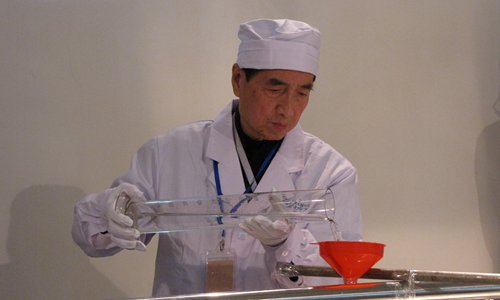HOME >> CHINA
88-year-old pioneer has played pivotal role in China’s nuclear industry
By Hu Yuwei Source:Global Times Published: 2019/8/29 19:48:41

Zhou Yongmao carries out an experiment on his Boron Neutron Capture Therapy project. Photo: Courtesy of Zhou Yongmao
At 88 years of age, Zhou Yongmao remains as enthusiastic about his job as any young person, and arrives at his office for work promptly every day. As one of China's earliest nuclear submarine and nuclear reactor experts, Zhou was appointed as an academician of Chinese Academy of Engineering in 1995. He now works as a senior engineer at the China National Nuclear Corporation.
"China's nuclear power development was first driven by the need to develop its own nuclear submarines. Now China's overall nuclear power level is leading the world, both in terms of hardware and software facilities," Zhou told the Global Times.
Zhou has made great contributions to China obtaining its own nuclear power technology intellectual property rights. "We must continue to develop our own nuclear energy technology at all costs without hesitation. We cannot play into Donald Trump's hands. The level of nuclear weapons in our country is not far behind that of the most advanced nuclear weapons in the US," he said.
Early devotion
Zhou has been engaged in the design, research and construction of China's critical reactor engineering and technology for decades. He has completed many major scientific research tasks in China, including early submarine nuclear power reactor design schemes.
He also participated in the successful design and construction of the high flux neutron beam reactor.
Zhou graduated from Shanghai Jiaotong University in 1955. Upon graduation, he was assigned to the Third Ministry of Machine Building, the predecessor of the Ministry of Nuclear Industry, due to his outstanding performance. He was then sent to the former Soviet Union for another three years to further explore nuclear power technology.
"I learnt that the former Soviet Union developed the first nuclear power plant in the world from a news report in 1954," Zhou told the Global Times. "That surprised me a lot. At that time, coal was the main source of electricity in China, but transporting it took up a lot of resources."
"But one kilogram of uranium can produce the same energy as 2,500 tons of high-quality coal, largely reducing the pressure on transport. From then, I became very interested in nuclear energy," said Zhou.
During his study in the former Soviet Union, Zhou was given an opportunity to go to the world's first nuclear power station to conduct research, which gave him a lot of experience for his future work with nuclear submarines.
Shortly after Zhou returned from studying in the former Soviet Union, China decided to develop its own nuclear submarines, said Zhou.
"I had never seen a conventional submarine, let alone a nuclear one, so I was overwhelmed by the task. The schedule was quite tight. There were no computers, so complex operations were all done by hand."
Zhou and two colleagues spent the night searching for information that was already public in other countries.
"Technologies that were mature and no longer secrets for some developed countries were very valuable references for us," Zhou recalled.
Zhou is proud to have witnessed the beginning of China's atomic age. He was determined to pursue this industry, not just out of enthusiasm, but to better understand the great cause that Marie Curie initiated, said Zhou.
At that time, nuclear energy was also an important front in China's economic and national defense construction efforts. Zhou was inspired by legendary figures such as Qian Sanqiang, a Chinese physicist who is often called the father of the Chinese nuclear program, who gave them a great deal of advice in their work.
Exposure risks
"Scientists need to be willing to make sacrifices," said Zhou, whose faith in scientific development has never been shaken in decades of research.
Zhou has experienced two cases of excessive nuclear radiation in his career.
One case involved a "fuel burnout" at a test rig in a research reactor in 1969. The situation was urgent and required people to clean up fissile debris, which gives off extremely damaging radioactive fission gases that can seep into the body.
Zhou, as the director of the research office at that time, was the first to volunteer for the job. "I already have a son and a daughter. Young people should not be exposed to this risk," he thought.
After working for 20 minutes, they came out and were found to have tiny bits of debris stuck onto the skin of their feet.
Their wounds were treated with petroleum sulfur acid until the blood spots were scraped from the surface, but the radioactive contamination was not completely removed.
Years after the accident, Zhou was found to have problems such as lumbar spinal canal thinning, excessive blood glucose and lipid levels and gallstone enlargement, which led him to suspect that the injury could be accelerating his aging.
In Zhou's eyes, with the improvements in China's nuclear industry, more attention should be paid to the application of nuclear technology in people's lives. One case in point is Boron Neutron Capture Therapy (BNCT), led by Zhou, which uses nuclear technology to target cancer cells with precision.
BNCT therapy is the result of joint research and achievements by nuclear reactor engineering experts, neurosurgery experts and radiation protection experts in China. It's a project that Zhou has been working on and promoting recently.
"I'm almost 90 years old, and many of the scientists I worked with have passed away," said Zhou.
"I probably won't be able to keep a clear mind to talk to you if you come to interview me next year," Zhou told the Global Times. "As long as I have a clear mind for one more day, I will never give up my nuclear energy career."

Newspaper headline: Life of service